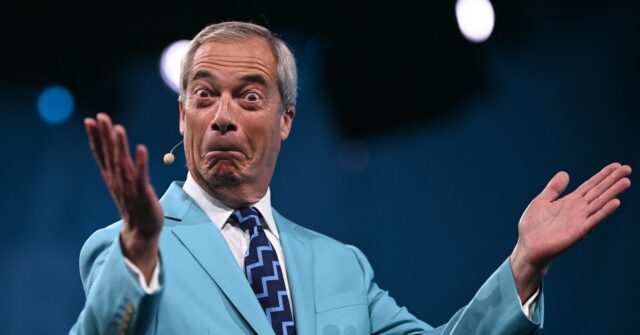The future of the British political landscape appears to be shifting to the right, with a poll finding that Brexit boss Nigel Farage is by far the most popular politician among 13 to 17-year-olds.
While Sir Kier Starmer’s left-wing Labour Party is attempting to demonise Reform UK leader Nigel Farage as a “racist” and an “enemy”, it is unclear if the rhetoric which has long swayed the Millennial vote to the left will continue to work with their more right-wing successors.
According to a survey from Merlin Strategies for the New Statesman, of the 13 to 17-year-olds who intend on voting in the next general election — scheduled for 2028 — 33 per cent said that they would vote for Farage’s Reform party, compared to 27 per cent for Labour, and 12 per cent for both the Conservatives and Greens.
Even more strikingly, Mr Farage’s personal popularity was unmatched among rival politicians. According to the survey, 38 per cent of British teens have a favourable view of the Brexit chief, compared to 25 per cent for Prime Minister Starmer, 23 per cent for former Labour leader Jeremy Corbyn, and 16 per cent for Tory leader Kemi Badenoch.
Adding insult to injury, all of Farage’s top-flight opponents scored a lower popularity rating than U.S. President Donald Trump, who came in as the second-most popular politician among British teens at 28 per cent.
Mr Farage also compared favourably to prominent celebrities, scoring a higher favourability than Grammy award-winning rapper Kendrick Lamar and nearly equalling the rating of former Top Gear presenter Jeremy Clarkson.
“If these preferences stay as they are, then it’s clear we’re hitting on the beginning of a social revolution of sorts. Britain’s incredibly apathetic young are as willing to vote right-wing just as much as the generation before them are willing to go left,” the New Statesman remarked on the poll.
Unlike his opponents, Farage has proven adept in the social media landscape, frequently publishing videos on platforms such as X and TikTok, which are increasingly becoming a main source of news and information for younger people throughout the West.
While Farage often plays up the memeable aspects of his personality for social media clicks, the Reform boss has expressed optimism about the changing character and focus of his increasingly younger supporters. He told Breitbart News last year: “It’s happening. Gen-Z is very different. Very different to Millennials. I see a lot more ambition, I see a lot more rejection of what they’re being indoctrinated with at school and university.”
“I see a lot of 1980s thinking in a growing number of young people. They’re quite ambitious, they want to get houses, they want to get well-paid jobs. They turn up at events I do, they’re all quite well turned out. It’s quite interesting, whereas the Millennials talk about work-life balance and things like that. There’s a big generational shift,” Farage added.
Reform’s popularity among teens may play a vital role in the next general election, which will be the first to allow 16- and 17-year-olds to cast their votes. As with teens, Reform has grown in popularity among the general public and has been forecasted to win the next general election in over 100 polls since the start of the year. According to the latest MRP seat-by-seat projections from YouGov, Farage’s party is on pace to win 311 seats in the House of Commons, likely meaning that the Brexit boss would become prime minister after the next election.
Follow Kurt Zindulka on X: Follow @KurtZindulka or e-mail to: [email protected]
Read the full article here
